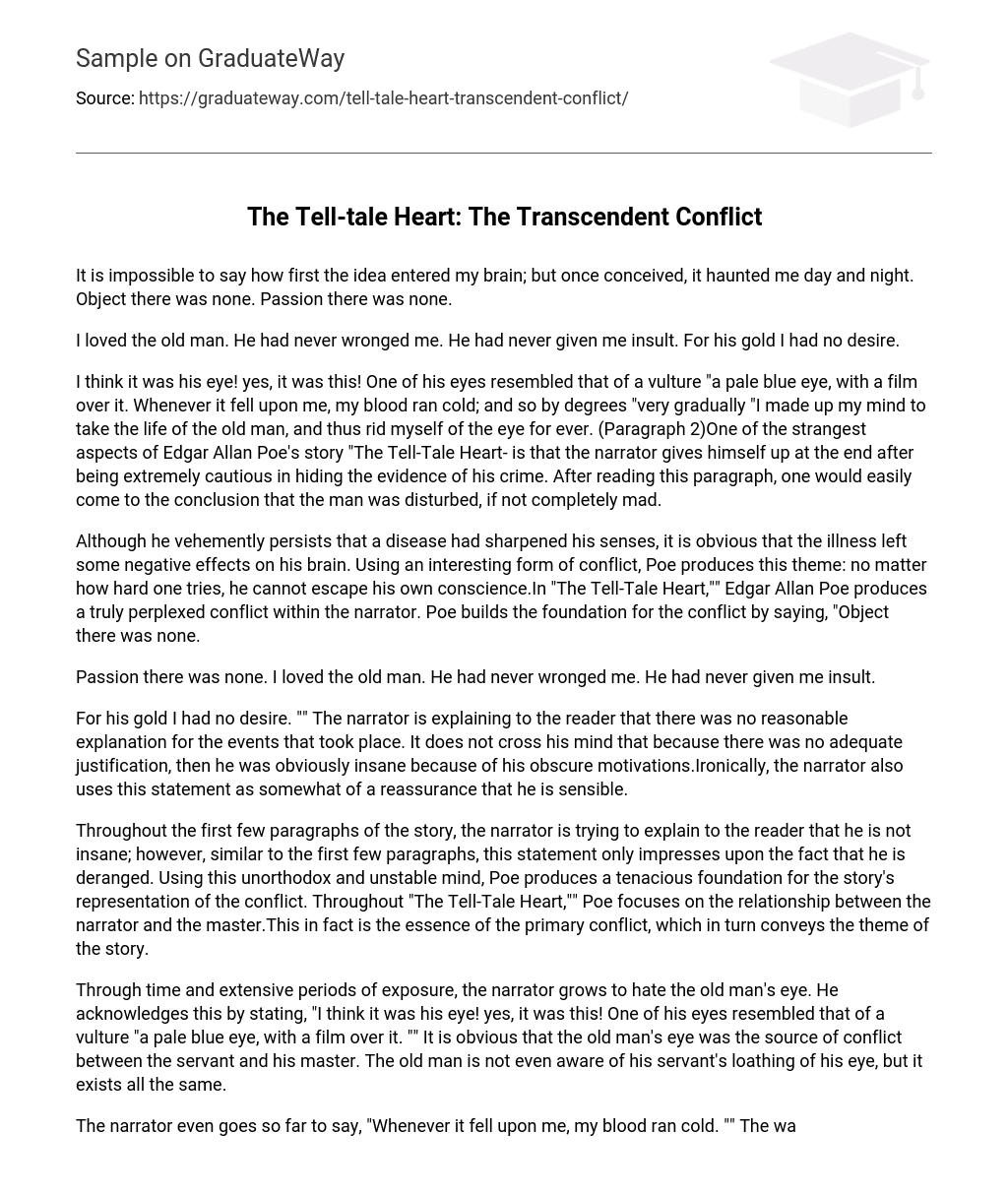It is impossible to say how first the idea entered my brain; but once conceived, it haunted me day and night. Object there was none. Passion there was none.
I loved the old man. He had never wronged me. He had never given me insult. For his gold I had no desire.
I think it was his eye! yes, it was this! One of his eyes resembled that of a vulture “a pale blue eye, with a film over it. Whenever it fell upon me, my blood ran cold; and so by degrees “very gradually “I made up my mind to take the life of the old man, and thus rid myself of the eye for ever. (Paragraph 2)One of the strangest aspects of Edgar Allan Poe’s story “The Tell-Tale Heart- is that the narrator gives himself up at the end after being extremely cautious in hiding the evidence of his crime. After reading this paragraph, one would easily come to the conclusion that the man was disturbed, if not completely mad.
Although he vehemently persists that a disease had sharpened his senses, it is obvious that the illness left some negative effects on his brain. Using an interesting form of conflict, Poe produces this theme: no matter how hard one tries, he cannot escape his own conscience.In “The Tell-Tale Heart,”” Edgar Allan Poe produces a truly perplexed conflict within the narrator. Poe builds the foundation for the conflict by saying, “Object there was none.
Passion there was none. I loved the old man. He had never wronged me. He had never given me insult.
For his gold I had no desire. “” The narrator is explaining to the reader that there was no reasonable explanation for the events that took place. It does not cross his mind that because there was no adequate justification, then he was obviously insane because of his obscure motivations.Ironically, the narrator also uses this statement as somewhat of a reassurance that he is sensible.
Throughout the first few paragraphs of the story, the narrator is trying to explain to the reader that he is not insane; however, similar to the first few paragraphs, this statement only impresses upon the fact that he is deranged. Using this unorthodox and unstable mind, Poe produces a tenacious foundation for the story’s representation of the conflict. Throughout “The Tell-Tale Heart,”” Poe focuses on the relationship between the narrator and the master.This in fact is the essence of the primary conflict, which in turn conveys the theme of the story.
Through time and extensive periods of exposure, the narrator grows to hate the old man’s eye. He acknowledges this by stating, “I think it was his eye! yes, it was this! One of his eyes resembled that of a vulture “a pale blue eye, with a film over it. “” It is obvious that the old man’s eye was the source of conflict between the servant and his master. The old man is not even aware of his servant’s loathing of his eye, but it exists all the same.
The narrator even goes so far to say, “Whenever it fell upon me, my blood ran cold. “” The way that this conflict projects the theme is that the old man’s eye, no matter how horrid, wouldn’t alone drive a person to murder. This happened by the narrator’s frequent exposure to the eye, which caused his mind to blow it’s aberration out of proportion, causing it to almost take on a life of its own. He couldn’t free his head from these thoughts, so his mind had control of the story’s conflict.
The literacy element, conflict, is used in “The Tell-Tale Heart- to convey the theme: no matter how hard one tries, he cannot escape his own conscience. Even though the narrator of the story definitely had some severe mental problems, these alone didn’t cause this dramatic series of events. These plus his mind’s incessant fixation on the contortion of the eye drove him over the edge. Even when he could supposedly hear the old man’s heart beating beneath the floor boards, the fear was not of seeing the old man again, it was of seeing his vulture-like eye.





